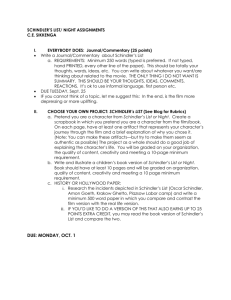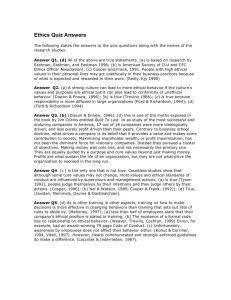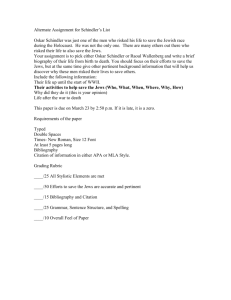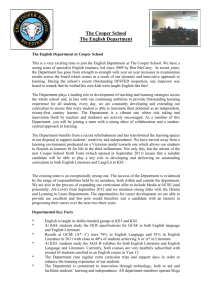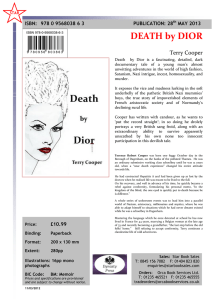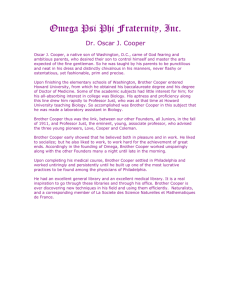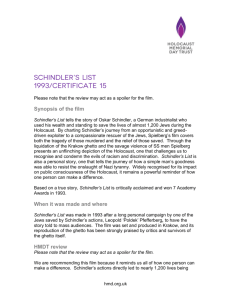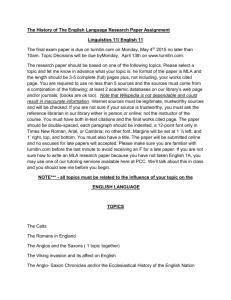Business Research Methods - The Emirates Academy of Hospitality
advertisement
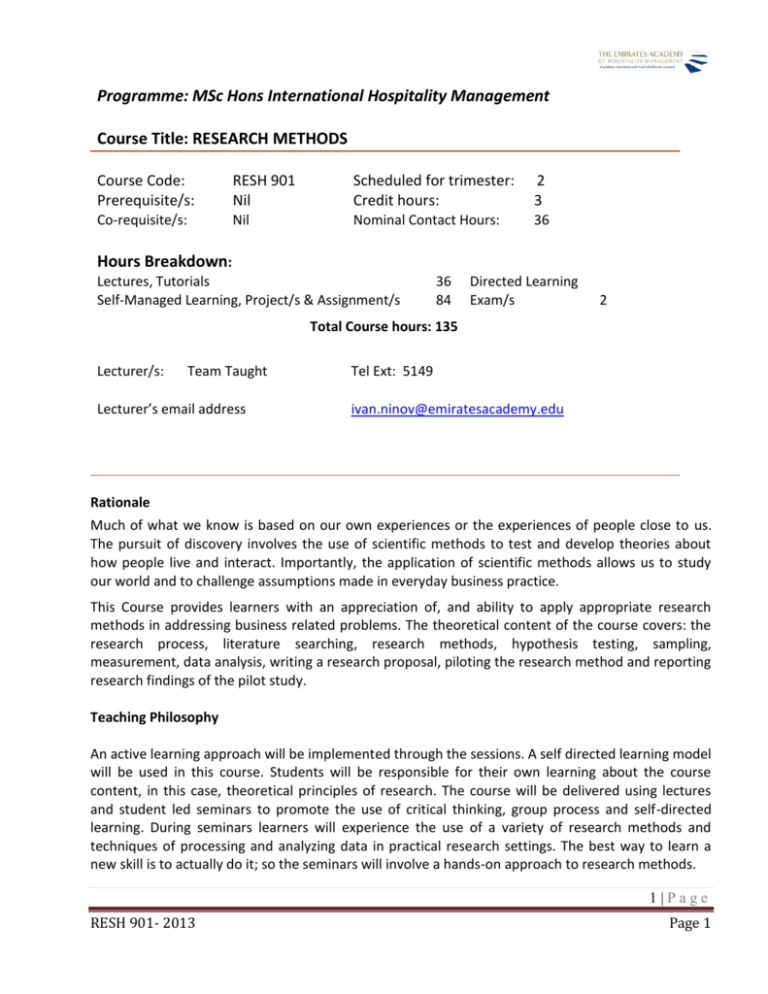
Programme: MSc Hons International Hospitality Management Course Title: RESEARCH METHODS Course Code: Prerequisite/s: RESH 901 Nil Scheduled for trimester: Credit hours: 2 3 Co-requisite/s: Nil Nominal Contact Hours: 36 Hours Breakdown: Lectures, Tutorials Self-Managed Learning, Project/s & Assignment/s 36 84 Directed Learning Exam/s 2 Total Course hours: 135 Lecturer/s: Team Taught Lecturer’s email address Tel Ext: 5149 ivan.ninov@emiratesacademy.edu Rationale Much of what we know is based on our own experiences or the experiences of people close to us. The pursuit of discovery involves the use of scientific methods to test and develop theories about how people live and interact. Importantly, the application of scientific methods allows us to study our world and to challenge assumptions made in everyday business practice. This Course provides learners with an appreciation of, and ability to apply appropriate research methods in addressing business related problems. The theoretical content of the course covers: the research process, literature searching, research methods, hypothesis testing, sampling, measurement, data analysis, writing a research proposal, piloting the research method and reporting research findings of the pilot study. Teaching Philosophy An active learning approach will be implemented through the sessions. A self directed learning model will be used in this course. Students will be responsible for their own learning about the course content, in this case, theoretical principles of research. The course will be delivered using lectures and student led seminars to promote the use of critical thinking, group process and self-directed learning. During seminars learners will experience the use of a variety of research methods and techniques of processing and analyzing data in practical research settings. The best way to learn a new skill is to actually do it; so the seminars will involve a hands-on approach to research methods. 1|Page RESH 901- 2013 Page 1 An active learning approach will be implemented through the sessions. A self-directed learning model will be used in this course. Students will be responsible for their own learning about the course content, in this case, theoretical principles of research. The course will be delivered using lectures and student led seminars to promote the use of critical thinking, group process and selfdirected learning. During seminars learners will experience the use of a variety of research methods and techniques of processing and analyzing data in practical research settings. The best way to learn a new skill is to actually do it; so the seminars will involve a hands-on approach to research methods. Aims: The aims of this course are: 1. To be able to identify a researchable question/s and critically appraise the literature as a means of examining and defining knowledge gaps. 2. To be able to describe and apply the research process. 3. To be able to write a research proposal for an identified research question. 4. To be able to defend a research proposal prepared to research and identified question. 5. To conduct a pilot study of the proposed research. 6. To be able to critique a research article. Specific learning outcomes: By the end of the course learners will be able to: Specific Learning Outcomes Knowledge: Upon completion of this course, students will know how to: LO 1. Discuss various types of research and the role of research in business decision making. LO 2. Assess and explain the relevance of existing literature on a particular business research topic. LO 3. Analyse the elements in a research setting to soundly construct an appropriate research question. LO 4. Select and apply quantitative and qualitative methods to investigate a research question. LO 6. Assess and apply principles, methods and techniques to correctly identify a research sample. LO 7. Describe and apply principles, methods and techniques in the collection, processing and analysis of research data. LO 8. Describe and apply principles to ensure that research is undertaken in an ethical manner. 2|Page RESH 901- 2013 Page 2 Skill Upon completion of this course, students will be able to demonstrate: LO 9. Selection and use of appropriate research tools and strategies LO 10. Literacy skills to comprehend and produce from a wide range of information, coherent texts, covering complex and diverse relations Autonomy and Responsibility Competence Upon completion of this course, students will be able to state the following reporting, regulating or ethical considerations: LO 11. Can select a research method that is consistent with the aim of the research to be undertaken. LO 12. Can design and implement an appropriate method to collect primary data. Self-Development Competence Upon completion of this course, students will be able to demonstrate the need to continually research and up skill the following areas: LO 13. Can complete a written research proposal in accordance with the academic and scholarly guidelines provided. LO 14. Understands the ethical standards in research Role in Context Competence Upon completion of this course, students will be able to effectively contribute to the following activities or endeavours: LO 15. Can plan the research in accordance with the principles of the scientific method LO 16. Can act as an investigator in the fields of tourism and hospitality Transferable and Employment Skills SKILLS PRACTICED TAUGHT ASSESSED 1. Written Communication X X X 2. Verbal Communication X X X 3. Commercial Awareness 4. Problem Solving X 5. Networking X 6. Planning and Organising X X X 7. Numeracy X X X 8. Computer Literacy X 9. Time Management X X X 10. Research X X X X 3|Page RESH 901- 2013 Page 3 Indicative Content Indicative content: Research process, assumptions, limitations The research question Academic database searching Literature review Hypotheses Qualitative method (Interviews, focus groups) Quantitative methods (Surveys, Observation) Collecting data; defining study variables Populations and samples Inferential statistics; data analysis Ethics Total hours Hours 3 3 3 3 3 3 6 3 3 3 3 36 Teaching and learning strategies The course involves a combination of lectures, tutorials and experiential exercises. Lectures and tutorial problems are supplemented with both printed and software learning materials. Additional readings and assignments will be handed out in class as needed. The workload consists of class preparation, class participation, and completion of assignments and problems as presented. Assessment and Evaluation Coursework 100% - assesses all learning outcomes Your final grade will be on the basis of your performance in the following two (2) evaluations: Quizzes (20 %) There will be a total of three quizzes in this course. They will account for 20% of your final grade. The quiz material will come from the textbook and from class information. The quizzes can be administered at the beginning or at the end of the class session. Research topic literature review (30%) Individual Assignment: A concise paper, of 2500 words, is to be prepared to present a scholarly discussion of existing knowledge about your selected business research topic. The paper will demonstrate the student’s knowledge and understanding of the research topic and provide evidence to support why a proposed research question should be researched. Twenty (20) refereed journal articles are required to complete this paper. Written research proposal: (50%) The objective of the research proposal is for you to integrate the different facets of research methods into a single proposal. The topic of the research proposal should be related to a business area relevant to the tourism and hospitality industry. The purpose of a research proposal is to 4|Page RESH 901- 2013 Page 4 convince your target audience (i.e., a funding agency, a thesis committee) that the research project is relevant to the industry and able to be completed. The research proposal should be 4000 words (inclusive of references) and include the proposal format below. Research Proposal Outline Title Concisely summaries what the study is about. Introduction Introduces the subject of study. Articulates the purpose of the study. Identifies that, based on current research, certain issues need further investigation, often referred to as the “gap” in knowledge. States the research question/hypothesis. Research problem Elaborates on the context and importance of the research problem. Literature review Identifies important concepts/theories as a foundation for the study. Discusses prior empirical studies (if available). Clearly leads to the hypothesis/research question. Presents literature that supports and that differs from the researcher's position. Is written critically (giving strengths and weaknesses of previous work). Comprises primary sources. Uses current references, or a combination of current and classic. Research question The research question is clearly stated. Ethical considerations Ethical approval from appropriate review boards is discussed. Potential ethical issues are described. Quantitative: hypotheses stated. Qualitative: questions stated An overall summary of your methodological approach is provided. Justification for using the method is documented. The study setting is described Hypotheses & questions Research method Study setting 5|Page RESH 901- 2013 Page 5 Population is stated. The type of sample used is identified (probability or non-probability) and supported. The sample size is discussed. The method of selecting the sample is described. Criteria for including and/or excluding people or items from the sample are clear and appropriate. Quantitative study Variables are appropriate to the problem and are operationalized. Data collection instruments are described. Reliability and validity of instruments is addressed. Qualitative study The data collection methods are described. The process to analyze data is stated. Appropriate statistical tests to be used to analyse quantitative data are stated. A budget to complete the study is estimated and itemized. A timeline for completion of the project is documented. Pilot study Results and discussion of pilot study included. Conclusion Likely outcomes are discussed. Potential limitations of the study are identified. Relevance of study to industry is supported. At least twenty (20) referred journal articles are used. The referencing style is the APA. Population & sample Planned data measurement and collection Planned data analysis Budget and timelines References 6|Page RESH 901- 2013 Page 6 Grading Rubric: Literature Review (30%) Marking Criteria The paper is focused on the research topic and the scope of the paper is clearly introduced The paper demonstrates the student’s understanding of the research topic The paper identifies a research question in the context of the literature presented The paper presents the student’s own ideas and compares and contrasts their ideas with the literature The paper provides reasons to support that the research question should be explored The closing paragraph summarizes the ideas discussed in the paper in a thoughtful manner Literature topic folder includes twenty (20) refereed journal articles The paper demonstrates evidence of scholarly work and is within the word limit APA referencing is correctly used throughout the paper Total Possible Mark 5 Awarded Mark 10 10 20 5 5 15 10 20 100 7|Page RESH 901- 2013 Page 7 Grading Rubric: Research Proposal (50%) Marking Criteria The title is reflective of the research problem and engaging The introduction includes relevant discussion to identify the background, context, and importance of the research problem Literature review is relevant and supporting the research question Ethical considerations are addressed Hypotheses/research questions are appropriate and able to be researched An appropriate research method is chosen and explained to conduct the research Planned data collection methods are appropriate and detailed Planned data analysis is appropriate and detailed Budget and timelines to complete the study are identified The pilot study results are discussed appropriately The conclusion summarizes the potential importance of the work for the industry The paper demonstrates evidence of scholarly work, is organized, professionally presented and within the word limit (3500-4000 words). APA referencing is correctly used throughout the paper and in the reference list. The proposal includes twenty (20) refereed journal articles Total Evaluation component Quizzes Literature review Research proposal Percentage of the final grade 20% 30% 50% Possible Mark 5 5 Awarded Mark 10 10 5 10 10 10 10 10 5 10 100 Submission Date Ongoing 5 February 2013 1 April 2013 Methods for Monitoring and Authenticating Student Work Classroom time must be spent on course related tasks. During this time the lecturer will become familiar with each student’s work in progress and will regularly monitor and discuss aspects of the work with students. All evaluation assignments must represent original work by the individual student, unless otherwise authorised. 8|Page RESH 901- 2013 Page 8 Academic Integrity All students are expected to adhere to Article 16 the EAHM Catalogue. Evaluation components of this course may be uploaded into turnitin to confirm the originality of a document and to identify potential plagiarisms. The turnitin program matches text from a student’s uploaded document to the turnitin database which is linked to original source documents. Information about turnitin can be obtained from the EAHM library staff or from the turnitin website: http://turnitin.com/static/plagiarism.html The citation policy used for all work completed in this course is the APA format. Instructional Materials and Resources Required text(s): Cooper, D.R. & Schindler, P.S. (2011). Business research methods (11th ed.). New York: McGraw Hill. Creswell, J. (2009). Research Design. California: Sage Publications, Inc. Pallant, J. (2007). SPSS Survival manual. Australia: Open University Press. Suggested Background Reading: To be advised Journal Articles: Relevant referred journal articles will be compiled by students for their literature review. Course Materials Available On EAHM Intranet: Class work requirements will be provided on Moodle. PowerPoint’s will not be posted for this course. The course texts provide the essential reading. Additional Resources: Additional resources will be advised during the course and will be dependent on the research questions presented by students. 9|Page RESH 901- 2013 Page 9 Tentative Course Schedule Week 1 Indicative Content Course overview, the research process Identifying a research question Lecture Introduction to course The research process Tutorial A research question Reading Cooper & Schindler, Ch 1 Cooper & Schindler, Ch 4 2 Literature review Academic database searching Refining a research question Ethics Searching and using the literature Cooper& Schindler Ch 5 Creswell, Ch 2 4 Research Question and Hypotheses Hypothesis testing Developing a research question literature searching Completing an ethics application Writing a hypothesis 5 Qualitative methods: Interview, focus group Research designs: Qualitative methods Qualitative analysis 6 Observation method Research designs: Observation method 7 Quantitative method: Survey Research designs: Survey Developing an observation checklist Developing a survey 8 Data collection/Defining study variables Measurement and data collection 9 Populations and samples Obtaining study subjects 10 Inferential statistics Application of inferential statistics Analysing test statistics outputs Pallant, To be advised Quiz 3 11 Article critique Article critique Electronic resource 12 Article critique Article critique Article critique Article Critique 3 RESH 301- 2012 Ethics and research Revision of descriptive statistics Selecting a sample Cooper & Schindler, Ch 2 Cooper & Schindler, Ch 3 Creswell, Ch 7 Quiz 1 Cooper & Schindler, Ch 7 Creswell, Ch 9 Cooper & Schindler, Ch 8 Cooper & Schindler, Ch 10 Quiz 2 Cooper & Schindler, Ch 11 Cooper & Schindler, Ch 14 Electronic resource Page 10
